New developments across the EuroVelo network in 2022: National Coordinators achievements
The NECC/Cs network keeps growing and aims towards developing a EuroVelo Coordination Centre in each country crossed by the European cycle route network.
New developments on route section across Europe
Significant improvements have been made across the EuroVelo network over the past twelve months on the national and regional levels.
Safer and better cycling routes
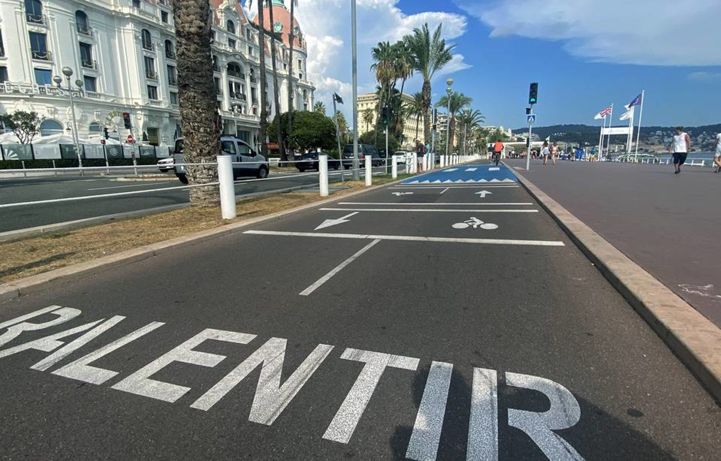
According to our data and desktop research, approximately 800km of brand-new EuroVelo cycling paths were built this year. There was also the restoration of some stretches that were altered by extreme weather conditions or natural degradation.
Four EuroVelo routes stood out regarding the number of kilometres developed during the year. EuroVelo 8 – Mediterranean Route saw many works being completed in Spain, France and Italy. This autumn, 40 pedestrian crossings intersecting with the cycling path have been secured by installing rumble strips to make bicycles and e-scooters slow down at dangerous sections. Retro-reflective ground signs were also painted on the Promenade des Anglais to improve the coexistence of different modes of transport.
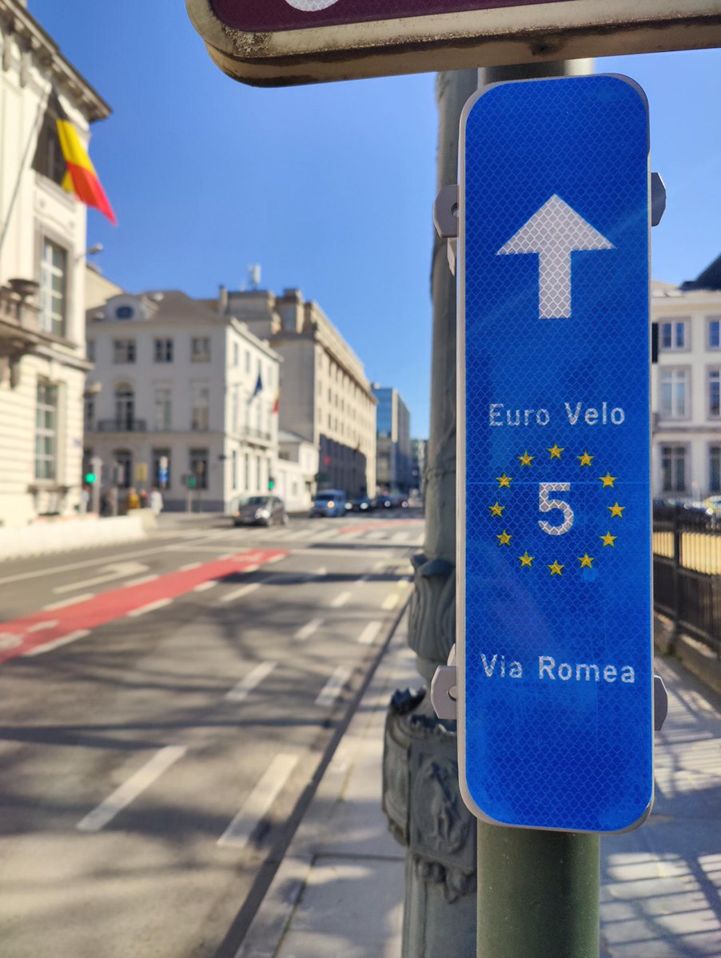
EuroVelo 1 – Atlantic Coast Route also progressed well with 470km of cycling routes signed in Ireland in the frame of the AtlanticOnBike project. EuroVelo 5 - Via Romea (Francigena) also witnessed a milestone as the signage in Belgium was officially completed. This achievement represents 407km of signed and developed cycling routes. This resulted in the Belgian stretch of EuroVelo 5 being nominated by Fietsenwandelbeurs as the "Cycle Route of the Year 2023"! In 2022, approximately 1,220km of cycling routes were signposted with EuroVelo signs across the network. In addition, there were many announcements of new works to come in Greece, Romania, and Lithuania for EuroVelo 13 – Iron Curtain Trail.
In terms of countries, Spain led the way with improved cycling routes in the Cadiz province for EuroVelo 8 and Navarre region for EuroVelo 3 in the frame of the BICIMUGI project. Hungary also did well with many works being conducted along EuroVelo 14 – Waters of Central Europe. This summer also saw a promising announcement in Italy with their new National Cycling Strategy mentioning the goal to fully develop its four EuroVelo routes.
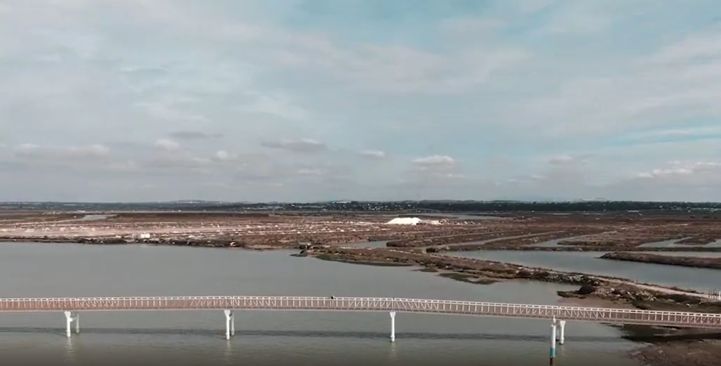
Major new cycling infrastructure
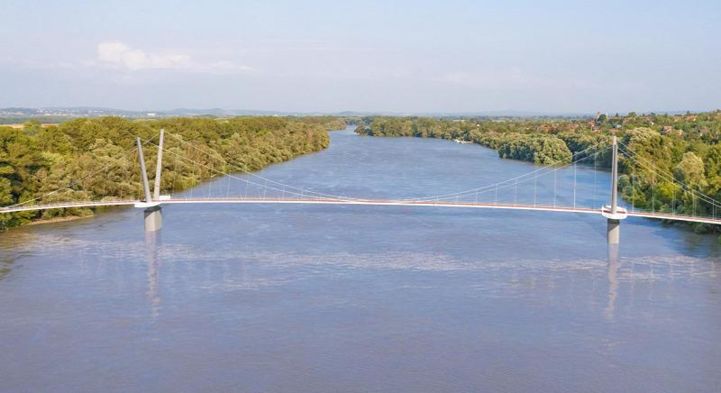
There are also some noteworthy cycling infrastructure projects to put into light. In particular, five new cycling bridges have been constructed. The first cycling bridge crossing the Danube was completed in Hungary along EuroVelo 6 – Atlantic Black Sea between Dunabogdány and Kisoroszi along with a 21-km cycle path between Kisoroszi and Szigetmonostor.
In Germany, the Ahr bridge between Sinzig and Remagen-Kripp was restored along EuroVelo 15 – Rhine Cycle Route after the devastating floods of 2021. This 40-metre-long steel structure necessitated an investment of half a million euros.
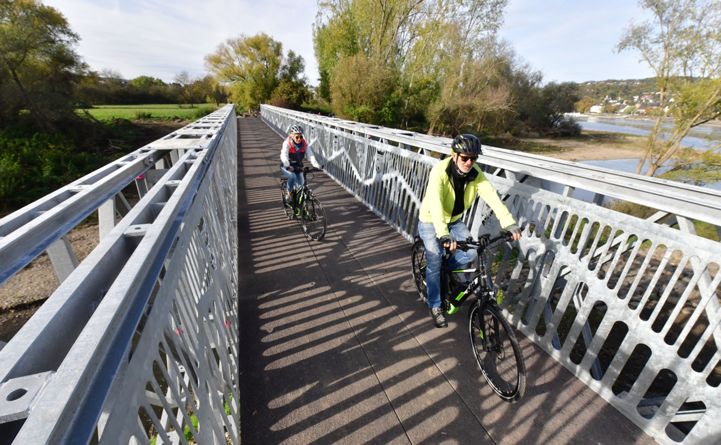
More cycle-friendly facilities
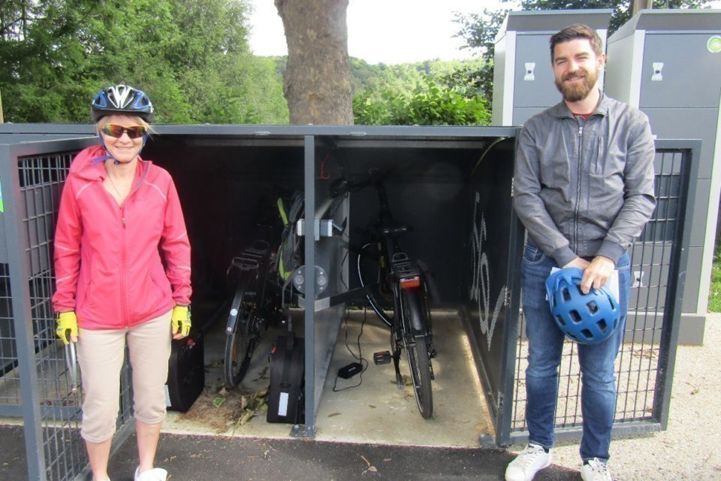
We could not pretend to be exhaustive in this article as many cycle-friendly facilities were put into place this year, from small free-to-use equipment to more extensive facilities. However, we can highlight that even in small villages such as Mortain-Bocage (France) along EuroVelo 4 – Central Europe Route (also called La Vélomaritime in France), excellent cycling services were installed. There are now six secured shelters with anti-theft devices and padlocks equipped with plugs for recharging e-bikes.
In Hungary, two resting areas were created along EuroVelo 11 as the bicycle path passes through the territory of the Pusztaszer Landscape Protection Area and the Special Bird Protection Area of the Lower Tisza Valley of the Natura 2000 network.
Cycling tourism promotion and new online resources
A trilingual EuroVelo Website in Belgium!
2022 was also an important year for the Belgian National EuroVelo Coordination Centre, ProVelo, in celebrating its 30th anniversary and making the national website promoting cycling tourism and travel information on EuroVelo routes trilingual.
New national platforms to plan your next cycling trip in Romania, Germany and Denmark
In Romania, a website and an application (the eVelo national platform) were developed to visualise GPX data of national cycling routes, including EuroVelo routes, in the frame of the National Recovery and Resilience Plan.
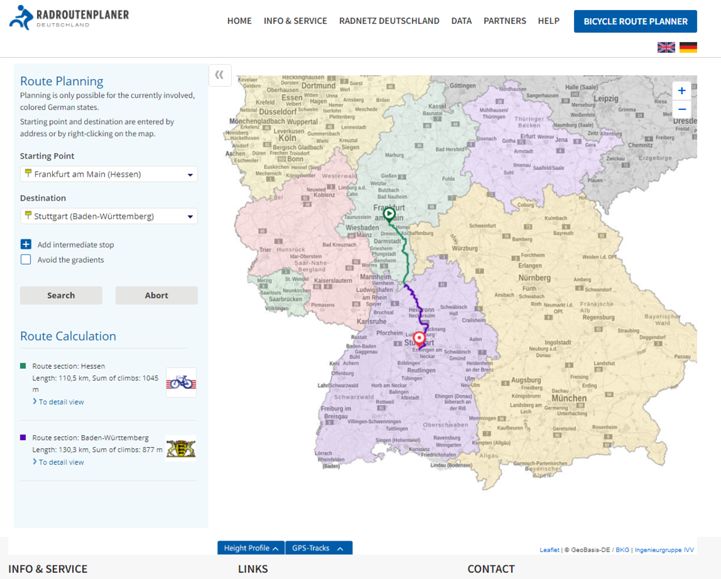
In July, the Radnetz Deutschland agency made public the GPX tracks of its national long-distance cycle routes network. You can now easily find your way on the 12 D-routes (the 12 national German long-distance cycle routes), the 'German Unity' Cycle Route and EuroVelo 13 - Iron Curtain Trail using the new route planner. The GPX tracks are available to download via this linkas a single data set.
Additionally, thanks to the joint effort of the Danish Road Directorate, Danish Transport Ministry and Danish Cycling Tourism, a platform dedicated to the 11 cycling routes in Denmark will soon be live. It will, of course include the Danish EuroVelo sections. There will be access to route descriptions, downloads of GPS tracks, tips for cycling trips and much more. The website is expected to be completed at the beginning of next year, and it is planned to later be expanded to include other routes and trip suggestions. More information here.
Finland is a Bikeland

In 2022, the Finnish NECC refreshed its image and communications with new logos, pictures, an updated website and even a new name!
Pyörämatkailukeskus became the Finnish Center for Cycling Tourism to adapt to an increasingly international public, Finland is now Bikeland, with a new Bikeland logo and a new « Welcome cyclist » logo to easily spot bike friendly services, cycle tourists are invited to explore the natural and cultural heritage of the Nordic country. A dedicated EuroVelo in Finland webpage is under construction.
All these changes came together with route developments. EuroVelo 10 from Vaalimaa to Turku was rerouted, improved and signed; and the section from Turku to Vaasa started the signing and development works.
Advocacy achievements
The EuroVelo network got mentioned in 11 national cycling strategies, according to the 2nd Edition of ECF's Report: The state of national cycling strategies in Europe (2022). The European cycle route network serves as a backbone and as a benchmark to develop national and regional cycling networks. Its potential to develop cycling tourism and diverging tourism flows is also recognised in these national cycling strategies. In this article, you can find more about the first eight national cycling strategies that included EuroVelo.
The work of the National EuroVelo Coordination Centres has also been important in supporting ECF's advocacy work to include more cycling and the EuroVelo network in the revised guidelines of the TEN-T, the flagship transport policy of the European Commission. We are especially thankful for the support from Vélo & Territoires, French NECC, and Conbici, Spanish NECC. In this article you can learn about the status of the TEN-T revision.
Many more achievements
We are aware that there was more information that we could have included here. Still, hopefully, this article provides an overview of the work being done on the EuroVelo network across Europe. You can learn more about the latest route developments in the report available in the EuroVelo Data Hub.
After a year marked by many achievements, there are once again a lot of good prospects for 2023!
Author: Alexandra Fournier